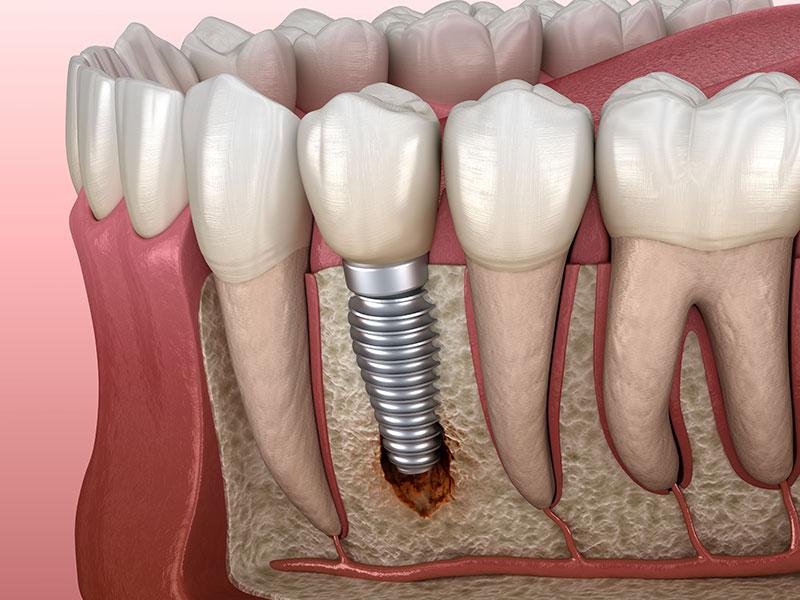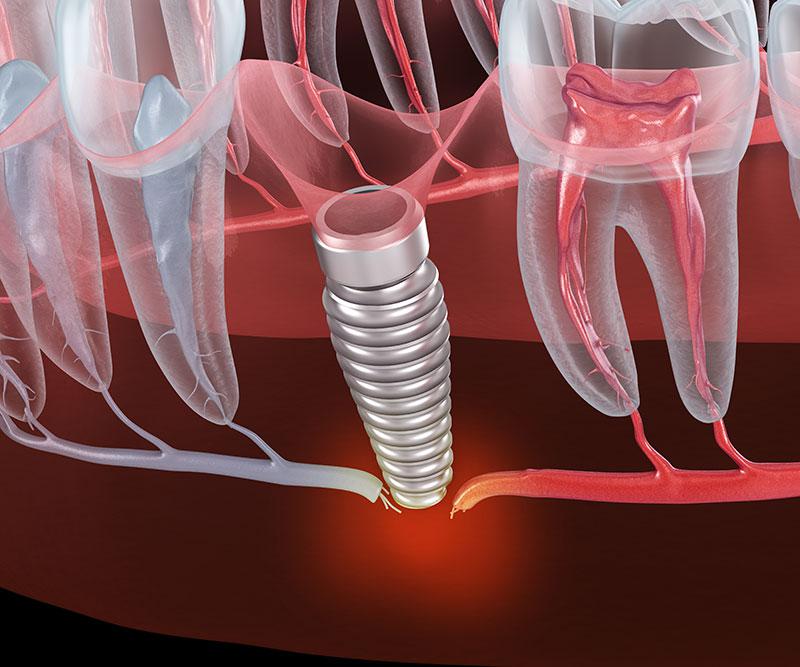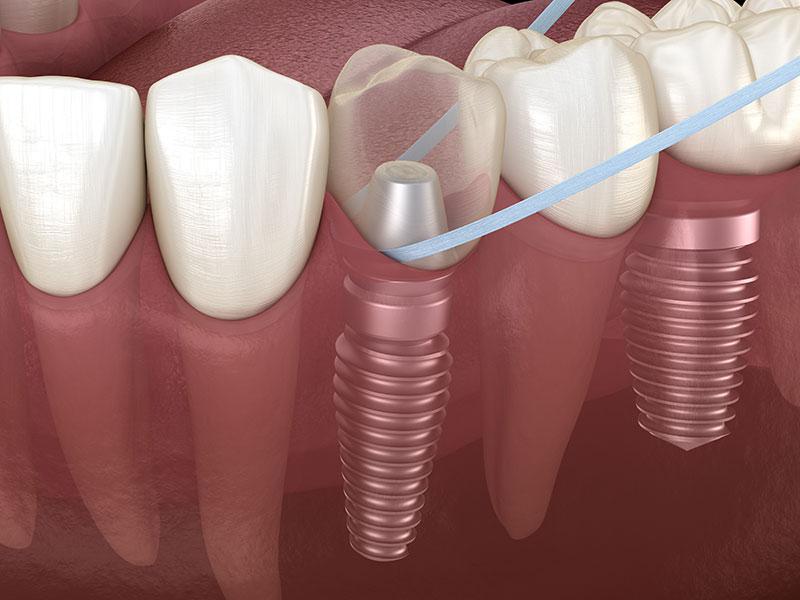 With every medical or surgical procedure comes some risks. There are chances that the procedure may fail or complications may arise. There are various protocols and preventive measures to counteract these complications and failures. However, sometimes, even after everything, failures may occur. This is also true for dental implants.
With every medical or surgical procedure comes some risks. There are chances that the procedure may fail or complications may arise. There are various protocols and preventive measures to counteract these complications and failures. However, sometimes, even after everything, failures may occur. This is also true for dental implants.
Dental implants in Phoenix, AZ, have revolutionized how we rehabilitate individuals who have lost their teeth. Dental implants have a high success rate; however, at times though rarely, they can fail.
An implant failure occurs when the implant fails to integrate with the jawbone. Late implant failure may also include poor cosmetic results and infections. This may happen due to a plethora of reasons. The following sections will discuss everything you need to know about dental implant failure.
Common reasons why dental implants fail?
Poor treatment planning
Dental implant placement is an art that requires years of learning and practice. There is a great deal of planning which goes into placing an implant. Oral surgeons prepare special guides and diligently study the quality and quantity of the jawbone before scheduling surgery. This proper pre-treatment planning contributes to the higher success rates of implants.
Poor treatment planning, faulty impressions, and compromised X-rays can all lead to miscalculations and contribute to poor treatment planning. All this can lead to dental implant failure.
The best way to avoid this is to ensure you are getting treated by a board-certified oral surgeon, as they have the knowledge and skills to ensure you get the best treatment possible.
 Poor post-operative care
Poor post-operative care
The way you care for your implant post-treatment will have a major impact on its outcome. Poor oral hygiene will lead to infections which contribute to implant failure. Consuming hard foods can disturb the implant in its early days, leading to the implant's failure. Failing to show up for regular follow-ups may also further contribute to implant failure. Therefore, you must maintain proper oral hygiene and follow the post-operative instructions diligently.
Peri-implantitis
Peri-implantitis is a type of gum disease that affects the gum surrounding the implant. Poor oral hygiene and other factors may predispose to the deposition of bacteria-laden plaque in and around the implant. These bacteria release noxious by-products, which lead to inflammation, and ultimately peri-implantitis develops. The bone surrounding the implant gets affected, which contributes to rapid bone loss. Eventually, if left untreated, the implant becomes loose and fails. Peri-implantitis is one of the most common reasons for dental implant failure.
Failed osseointegration
The rationale behind dental implant placement lies in its ability to osseointegrate. To put it simply, osseointegration is the process of dental implant fusing with the jawbone. This process allows the implant to become stable and firm. Osseointegration is imperative to the success of an implant. Failure of a dental implant to fuse with the jawbone leads to failure. This may be due to poor oral hygiene, infections, lack of adequate amount of bone height and width, and compromised bone quality.
Late dental implant failures
In some situations, implant failure may also be a late complication, like poor cosmetic results. The gums around the implant may recede due to gum disease revealing the dental implant underneath. This gives a metallic appearance to your smile, thus leading to cosmetic failure of the implant.
Can a failed dental implant be replaced?
There are stages of implant failure. Specific treatments such as deep cleaning, bone grafting, antibiotic coverage, and special care may save a failing implant if caught early. This is especially true in early cases of peri-implantitis. Cosmetically failed implants may also be saved by replacing the prosthesis or carrying gum lengthening surgeries followed by maintenance of good hygiene.
However, in some instances, a failed implant cannot be saved. In these situations, your surgeon will advise you to go for dental implant removal. Once the implant is removed, your surgeon will clean out the area and allow the traumatized tissues to heal. After some time, you can replace the failed implant with a new one without any complications.
In some cases, if you have less bone in the intended area. Your oral may also recommend specific bone grafting solutions in Phoenix, AZ. These procedures are often carried out before they replace your implant. The bone graft is placed, and new bone is allowed to form before attempting the second dental implant surgery.
 How can I prevent a dental implant from failure?
How can I prevent a dental implant from failure?
Many factors govern the success and failure of a dental implant. While some of them are in the control of your doctor, many of those factors are in the patient's control, that is you. So, if you want to ensure your dental implants are successful and last a long time, then follow our top dental implant care tips.
-
Maintain good oral hygiene. Brush your teeth twice a day with a good quality, soft nylon toothbrush. Use fluoridated toothpaste and floss every day to ensure no debris and plaque accumulates in your mouth. Rinse your mouth after every meal.
-
If you have opted for implant-supported dentures, then make sure you are rinsing your mouth twice a day with a medicated mouthwash after getting your implants placed.
-
Make sure you eat soft foods for the first few weeks after getting an implant placed. Hard food substances may disturb your implant.
-
Do not smoke or consume tobacco products, as this severely impacts the healing and increases your chance of getting peri-implantitis.
-
Make sure you are showing up for your regular follow-up appointments, as these allow your doctor to examine the health of your implant. Any sign of implant failure can be recognized early, and appropriate measures can be taken which will aid in saving the implant.
How common is dental implant failure?
The success rate for dental implants in Phoenix, AZ, ranges from 96-98%, which means 96 to 98 out of 100 dental implants placed are successful. Around 2-4 dental implants may fail out of every 100 dental implants that are placed. That means the percentage of dental implant failure is 2-4%. Thus we can conclude that dental implant failure is rare. In addition, we will take additional measures to ensure that your chances of a successful implant improve dramatically.
If you have any more questions or would like to know more about our services, please reach out to us at Phoenix Oral and Facial Surgery, Phoenix, AZ. Our team of excellent professionals is here to assist you with a glistening and healthy smile.

